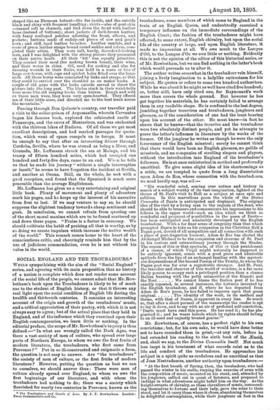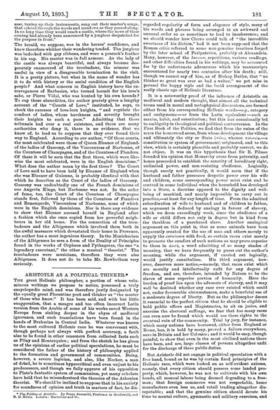SOCIAL ENGLAND AND THE TROUBADOURS.* WHILE sympathising with the aim
of the "Social England" series, and agreeing with its main proposition that no history of a nation is complete which does not render some account of the social life of the people, we cannot admit that Mr. Row- botham's book upon the Troubadours is likely to be of much use to the student of English history, or that it throws any real light upon the social condition of English life during the twelfth and thirteenth centuries. It contains an interesting account of the origin and growth of the troubadours' music, and a critical appreciation of their poetry, with which it is not always easy to agree; but of the actual place that they held in England, and of the influence which they exercised upon their English contemporaries, we learn little or nothing. In the editorial preface, the scope of Mr. Rowbotham's inquiry is thus defined :—" In what are wrongly called the Dark Ages, was there a vast society of men of culture, who spread over large parts of Northern Europe, to whom we owe the first fruits of modern literature, the troubadours, who first came from Provence F" Put in so ill-constructed and enigmatic a form, the question is not easy to answer. Are "the troubadours" the society of men of culture, or the first fruits of modern literature ? However, putting the question as best we can to ourselves, we should answer thus : There were men of culture already spread over England, to whom we owe the first beginnings of our literature, and with whom the troubadours had nothing to do; there was a society which flourished for nearly two centuries in Provence, known as the
• TS. Troubadours and Courts of Loss. By J. F. Rowbotbam. London : swan Sonnensohein and Co.
troubadours, some members of which came to England in the train of an English Queen, and undoubtedly exercised a temporary influence on the immediate surroundings of the English Court ; the fashion of the tronbadoura might have affected, to some extent, English chivalry, but upon the social life of the country at large, and upon English literature, it made no impression at all. We owe much to the Langue d'011, to the Langtte d'Oc we owe little or nothing. Evidently this is not the opinion of the editor of this historical series, or of Mr. Rowbotham, but we can find nothing in the latter's book which would persuade us to alter it.
The author writes somewhat in the troubadour vein himself, joining a lively imagination to a ladylike enthusiasm for his subject. He quotes or refers to some two hundred authorities. While he was about it he might as well have cited five hundred; or, better still, have only cited one, for Raynouard's work more than covers the whole ground. But however he has got together his materials, be has certainly failed to arrange them in any readable shape. He is confused to the last degree, jumbling together trouveres and troubadours, jongleurs and gleemen, as if the consideration of one had the least bearing upon his account of the other. He must know—in fact he shows that he knows—that the trouvere and the troubadour were two absolutely distinct people, and yet he attempts to prove the latter's influence in literature by the works of the former. Of the jongleur he writes as though he were the only forerunner of the English minstrel ; surely he cannot think that there would have been no English gleemen, no guilds of minstrels, and no companies of strolling singers and players, without the introduction into England of the troubadour's followers. He is at once unhistorical in method and profoundly uncritical. To give some slight idea of his shortcomings as a critic, we are tempted to quote from a long dissertation upon Adam de Ron, whose connection with the troubadours, we need hardly say, was nil :— "His wonderful mind, soaring over nature and history in search of a subject worthy of its vast imagination, lighted on the theme of St. Paul's visit to Hell as a subject at once epic and sublime. In this marvellous poem the whole of the Divina Commedia of Dante is anticipated and displayed. The original idea of the visit by a living man to the regions of the dead, who should be able to treasure and communicate his impressions to his fellows in the upper world—such an idea which we think so wonderful and pregnant of possibilities in the poem of Dante— has been anticipated and admirably developed by the English troubadour. With a far finer sense of congruity than that which prompted Dante to take as his companion in the Christian Hell a Pagan poet, devoid of all sympathies and all connection with such a place of post-Augustan torment, Adam de Ros has elected the Archangel Michael to be the companion and cicerone of St. Paul in his curious and extraordinary journey through the Shades. The reason of this or that spectacle, of this or that punishment of a sinner, of which Virgil might naturally be supposed to be entirely ignorant, comes with a good grace and admirable aptitude from the lips of an archangel familiar with the mysteri- ous dispensations of the Second Person of the Trinity, to whom the Pagan poet was for ever a regrettable stranger. And St. Paul, the traveller and observer of this world of wonders, is a far more likely person to occupy such a privileged position than a chance Italian. burning with the petty animosities of the Bianchi and the Neri We cannot blame the Italian poet if he has exactly repeated, in several instances, the tortures invented by the English troubadour, and if, where be has departed from Adam de Ros's poem, he has failed to improve upon that great
original The identity of the work, iu its method and theme, with that of Dante, is apparent in every line. So much so, that after a short perusal of the manuscript the reader is apt to lay it down, and to say with an air of profound self-conviction, Dante must have read this poem. He has read it ; he has pla- giarised it ; and he wears laurels which by rights should belong to an ill-used and unjustly treated genius."
Mr. Rowbotham, of course, has a perfect right to his own convictions ; but, for his own sake, he would have done better not to have recorded them in prints—at any rate, before he had extended his reading to the sixth book of the 2Eneid, and, shall we say, to the Divina Commedia itself. Not much less inept is his treatment of what records exist as to the life and conduct of the troubadours. He approaches his subject in a spirit quite as credulous and as uncritical as that of Jean Nostradamus, another authority upon troubadours :— "At the first breath of Spring, then, the troubadour, who had passed the winter in his castle, varying the exercise of arms with the composition of music, mounted on his steed, and, attended by his jongleurs, sallied out in quest of listeners, and prepared to indulge in what adventures might befall him on the way. As the knight-errants of chivalry, so these chevaliers of music, commend- ing themselves to fortune and their lady, gave the reins to their steed, and let it carry them where it chose, abandoning themselves to delightful contemplation, while their jongleurs on foot in the
rear, tuning up their instruments, sang out their master's songs. that echoed through the woods and meadows as they passed along. In no long time they would reach a castle, where the news of their coming had already been announced by a jongleur despatched for the purpose in front."
The herald, we suppose, was in the horses' confidence, and knew therefore whither their wandering tended. The jongleur was bedecked with gay ribbons, and wore a peacock's feather in his cap. His master was in full armour. As the lady of the castle was always beautiful, and always became des- perately enamoured of the troubadour, the armour was useful in view of a disagreeable termination to the visit. It is a pretty picture, but what in the name of wonder has it to do with history or the social condition of the English people ? And what concern in English history have the ex- travagances of Barbesieu, who turned hermit for his love's sake, or Pierre Vidal, who was hunted by his own hounds ?
To cap these absurdities, the author gravely gives a lengthy account of the "Courts of Love," instituted, he says, to check the excesses of love-lorn knights, "and regulate the conduct of ladies, whose harshness and severity brought their knights to such a pass." Admitting that these tribunals had ever a real existence, and there are many authorities who deny it, there is no evidence, that we know of, to lead us to suppose that they ever found their way to England. According to our author, "Of these courts, the most celebrated were those of Queen Eleanor of England, of the ladies of Gascony, of the Viscountess of Narbonne, of the Countess of Champagne, and of the Countess of Flanders.
Of these it will be seen that the first three, which were like- wise the most celebrated, were in the English dominions."
What does the author mean by the first three ? The Court of Love said to have been held by Eleanor of England when she was Eleanor of Guienne, is probably identical with that which he describes as the Court of the ladies of Gascony. Gascony was undoubtedly one of the French dominions of our Angevin Kings, but Narbonne was not. In the order of fame, too, the Court of the Countess of Champagne stands first, followed by those of the Countess of Flanders and Ermengarde, Viscountess of Narbonne, none of which were in the English dominions. Nor is there any evidence to show that Eleanor amused herself in England after a fashion which she once copied from her powerful neigh- bours in her old home. For the connection of the trou- badours and the Albigenses which involved them both in the awful massacre which devastated their home in Provence, the author has a most ingenious theory. In the Manicheeism of the Albigenses he sees a form of the Duality of Principles found in the works of Orpheus and Pythagoras, the one "a legendary execntant," the other a musical "theorist." The troubadours were musicians, therefore they were also Albigenses. It does not do to take Mr. Rowbotham very seriously.



































 Previous page
Previous page